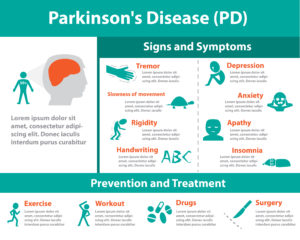Parkinson’s disease is a progressive neurological condition where part of the brain, called the substantia nigra, degenerates. This is the area of the brain that produces dopamine, which is needed to enable us to move smoothly and automatically. When there is not a lot of this chemical in the body, patients will present with slowness and stiffness. Roughly 1 in 4 people with Parkinson’s Disease will show a tremor. In lots of cases, their posture is affected and they become permanently bent over in a stooped posture.
Diagnosis of Parkinson’s Disease
A Neurologist should carry out any tests to diagnose Parkinson’s. One useful test, called a DaTSCAN, comprises of the harmless insertion of dye into the brain. The dye allows doctors to see what parts of the brain are starting to degenerate. A lot of people will have to get MRIs to check there is nothing else causing the problem. Carrying out a history and examination of the patient can also help to diagnose Parkinson’s. In the UK, about 120,000 people have Parkinson’s disease.

Treatment of Parkinson’s Disease
Often, if Parkinson’s disease is diagnosed, then patients are started on medication.  If that medication is effective, then that is a good indication that it is indeed Parkinson’s disease. The main treatment is with a medication called levodopa. There are different forms of this drug, but Sinemet and Madopar are the two main ones. Younger people will be started on slightly different drugs, but it is very much the choice of the consultant that sees the patient. There is a medication that is believed to be neuroprotective. This would mean that it would help to slow down the degeneration of the brain cells. However, most of the medication currently used is there to replace the missing dopamine.
If that medication is effective, then that is a good indication that it is indeed Parkinson’s disease. The main treatment is with a medication called levodopa. There are different forms of this drug, but Sinemet and Madopar are the two main ones. Younger people will be started on slightly different drugs, but it is very much the choice of the consultant that sees the patient. There is a medication that is believed to be neuroprotective. This would mean that it would help to slow down the degeneration of the brain cells. However, most of the medication currently used is there to replace the missing dopamine.
Most areas of the country have a Parkinson’s Disease nurse specialist. These specialist nurses will see patients in the clinic or at home. They are there to support them with the diagnosis and different symptoms they are presenting with. They would also monitor their medication and often refer to other useful health professionals.
Other Types of Health Professionals
Physiotherapists – These play an important role in keeping people with Parkinson’s Disease active. A diagnosis of Parkinson’s is not a reason to stop exercise but is actually a reason to get active. If they play sports or go to the gym, they are recommended to continue. If they were not very active before their diagnosis, physiotherapists recommend them to pick up some form of exercise. As well as this, physiotherapists will do exercises to improve their posture, range of movement and their balance. These are all vital things which will help people with Parkinson’s to live a happier and freer lifestyle.
Occupational Therapists – A lot of people with Parkinson’s Disease have difficulty with automatic movements. These are typically everyday tasks such as getting in and out of the bed and the bath. These sorts of things can become difficult for people with Parkinson’s. Occupational Therapists play a vital role in helping people with tasks like this by helping to install apparatus such as a bed rail, stairlift or toilet rail.
Speech and Language Therapists – With Parkinson’s Disease, peoples’ voices can become very quiet and quite slurred. Therefore speech and language therapists teach them techniques to improve their speech. People may also have problems with swallowing, so the speech and language therapist can advise on techniques to improve this.
Prognosis of Parkinson’s Disease
The typical prognosis of someone with Parkinson’s Disease is a normal life expectancy. However, there are certain risks which become much greater with some who has Parkinson’s. For example, people are much more likely to fall over. If a lot of damage is done during this fall, such as damage to their pelvis, then this could affect their mobility and consequently, their quality of life as well.
Here at Protrainings, we offer an “Understanding Neurology” course. For more information about this exciting and informative course, please visit our website.
For more information on training courses, visit our “Courses” page which also includes our First Responder and First Person on Scene (FPOS) Courses.

